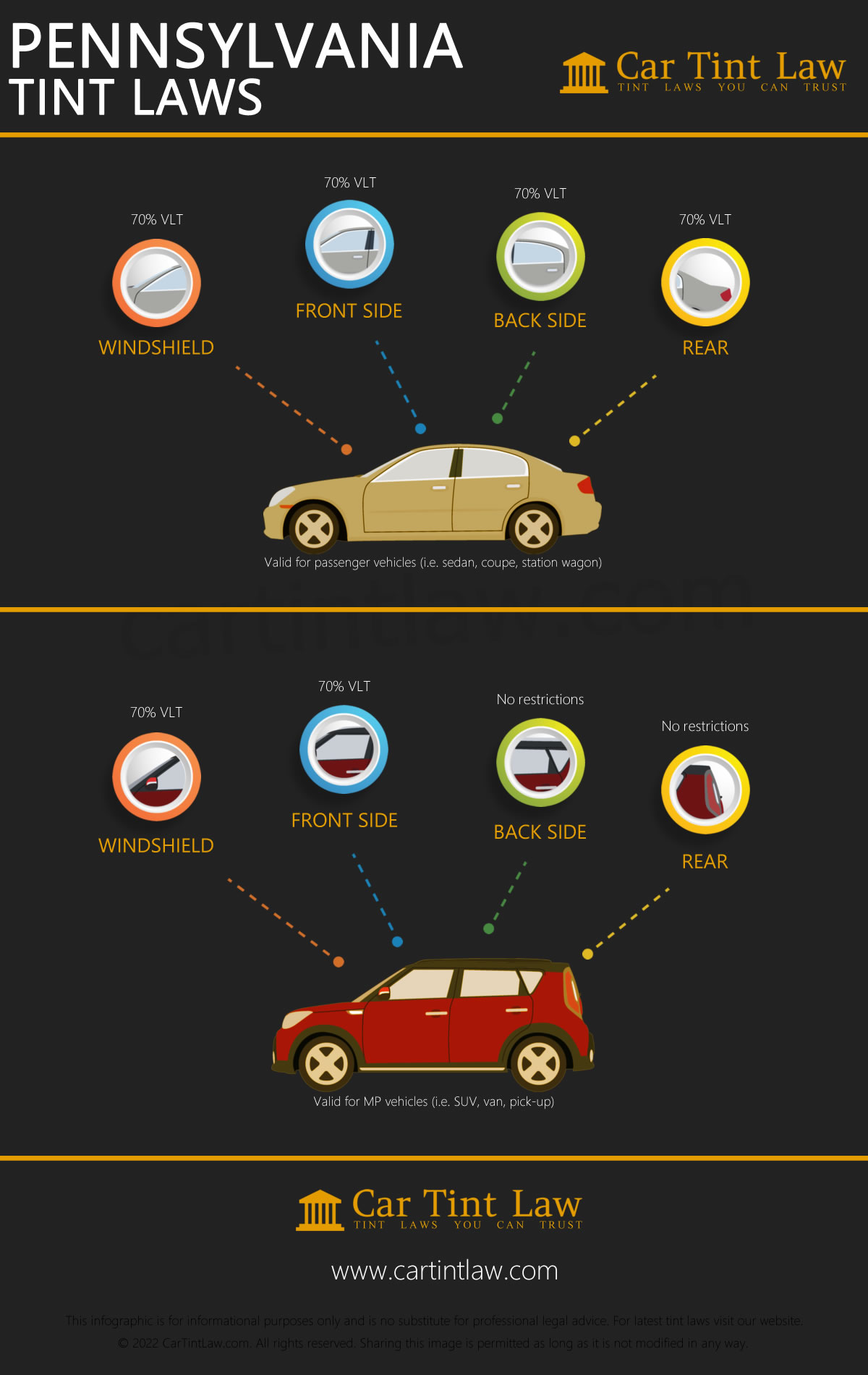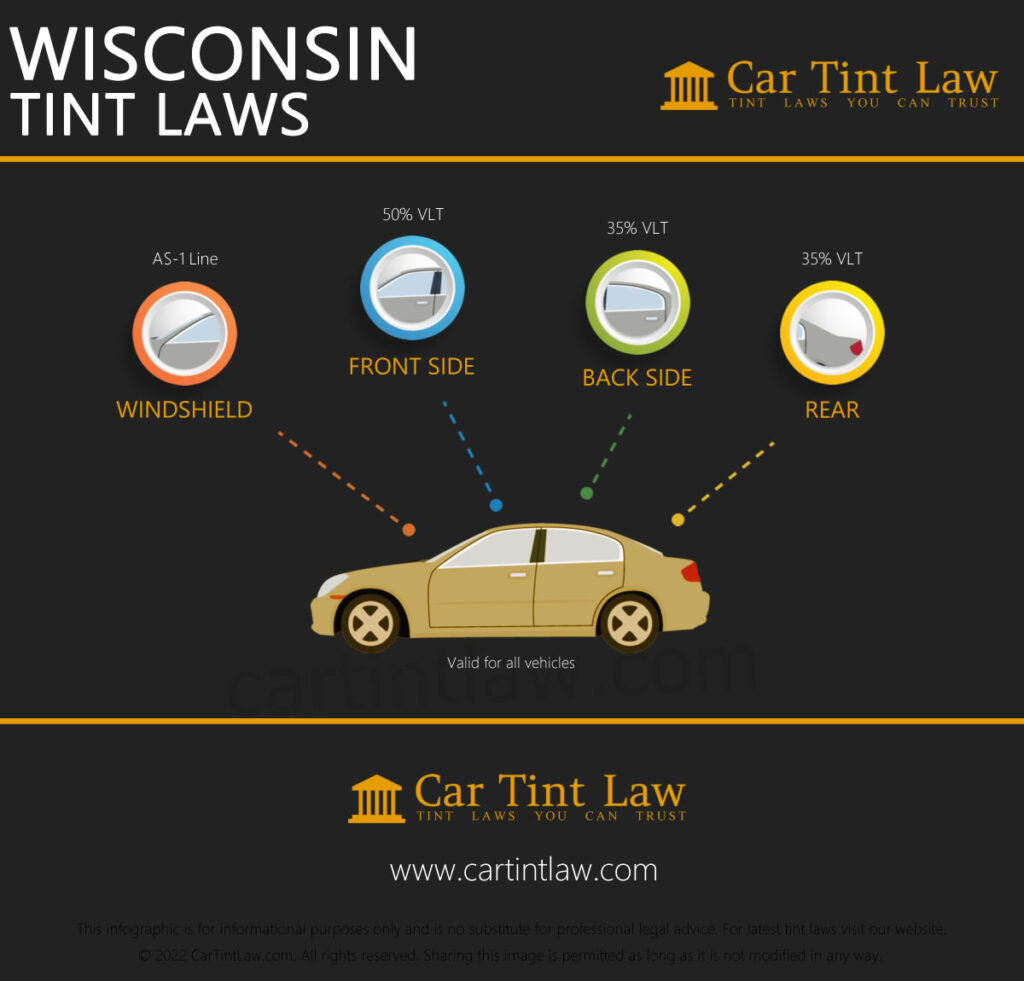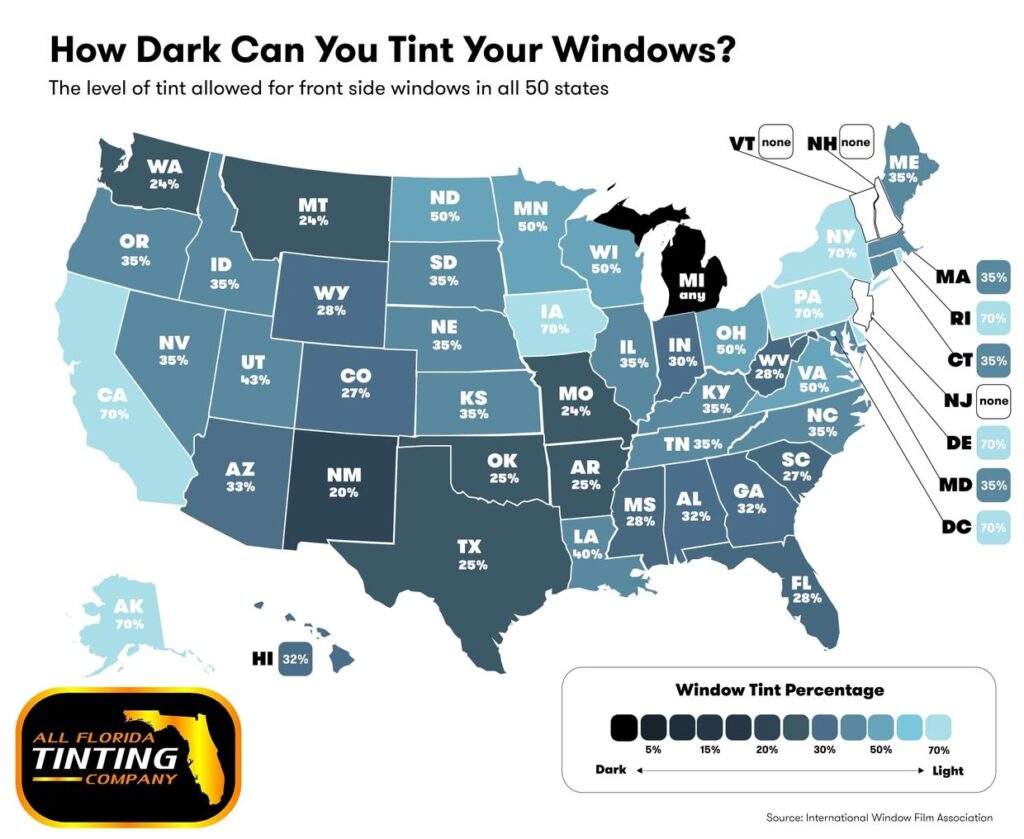As an Amazon Associate, I earn from qualifying purchases
Understanding Pennsylvania’s car window tint law is crucial for drivers. It helps avoid fines and ensures safety.
In Pennsylvania, the car window tint law specifies the permissible levels of tint for vehicle windows. These regulations are in place to ensure driver visibility and road safety. Knowing the law not only helps you comply but also protects you from potential penalties.
Whether you’re considering tinting your windows or already have, it’s essential to understand these rules. This guide will break down everything you need to know about PA’s car window tint law, making it simple and clear. Stay informed and drive safely by adhering to Pennsylvania’s window tint regulations.

Credit: www.cartintlaw.com
Introduction To Car Window Tinting
Car window tinting has become popular among vehicle owners. It offers numerous benefits, including privacy and protection from UV rays. But what exactly is car window tinting, and why should you consider it for your vehicle? Let’s dive in.
What Is Car Window Tinting?
Car window tinting involves applying a thin film to the windows of your vehicle. This film can be made from different materials, such as polyester or metal. The tint can vary in shade and thickness. Tinting can be done on all windows, but the laws may vary by state. It’s important to understand these regulations to avoid fines.
Benefits Of Window Tinting
Window tinting offers several benefits. It helps reduce glare from the sun. This makes driving safer by improving visibility. Tinted windows can also block harmful UV rays. This protects your skin and the car’s interior. Another advantage is added privacy. Tinting makes it harder for outsiders to see inside your vehicle. This can deter theft and protect your belongings.

Credit: www.raynofilm.com
Pennsylvania Tint Law Basics
Understanding the Pennsylvania Tint Law is important for every car owner. This law regulates how dark or reflective your car windows can be. By following the rules, you can avoid fines and drive safely.
Legal Tint Percentages
In Pennsylvania, the law specifies the visible light transmission (VLT) allowed for window tints. VLT refers to the amount of light that can pass through your car windows.
| Window | Legal VLT |
|---|---|
| Front Side Windows | 70% |
| Back Side Windows | Any |
| Rear Window | Any |
| Windshield | No tint allowed |
The front side windows must allow more than 70% of light in. The backside windows and rear window have no specific VLT limit. You cannot tint the windshield at all.
Penalties For Violations
Breaking the tint law can lead to fines and penalties. It’s important to comply with these rules to avoid trouble.
- First-time offenders may face a fine of $25.
- Repeated offenses can lead to higher fines.
- Police may also require you to remove the illegal tint.
Being aware of the Pennsylvania Tint Law can save you from penalties. Always check your window tint to ensure it meets legal standards.
Allowed Tint Levels For Different Windows
Understanding the allowed tint levels for different windows in Pennsylvania is important. The law varies for each type of window in your vehicle. Knowing these rules helps you stay compliant and avoid fines. Let’s dive into the specifics.
Front Windshield Tint
The front windshield tint in Pennsylvania must allow more than 70% of light in. This means the tint can only be slightly dark. The goal is to ensure clear visibility for safe driving. A darker tint on the front windshield is not allowed.
Front Side Windows Tint
The front side windows’ tint must also permit more than 70% of light. This rule ensures drivers have a clear view of their surroundings. It also allows law enforcement to see inside the vehicle. Darker tints are not allowed for front-side windows.

Credit: www.blackdiamondtint.com
Special Provisions And Exceptions
Car window tint laws in Pennsylvania have special provisions and exceptions. These rules ensure safety and fairness for all drivers. This section explains the specific cases where exceptions apply.
Medical Exemptions
Pennsylvania law allows medical exemptions for window tinting. Some medical conditions make people sensitive to sunlight. These conditions include:
- Lupus
- Sunlight allergy
- Skin cancer
To get an exemption, you need a note from a licensed doctor. The note must explain why you need darker window tints. You must keep this note in the car at all times. The police might ask to see it.
Commercial Vehicle Regulations
Commercial vehicles have different rules for window tinting. These vehicles include trucks, vans, and buses. The rules are:
| Vehicle Type | Allowed Tint |
|---|---|
| Trucks | Front side windows – 70% VLT |
| Vans | Rear windows – Any tint |
| Buses | Windshield – 70% VLT |
VLT stands for Visible Light Transmission. A higher VLT means more light can pass through the window. Commercial vehicles must follow these rules for safety reasons.
Inspection And Compliance
Understanding the inspection and compliance rules for car window tint in Pennsylvania is crucial for every vehicle owner. Proper knowledge ensures that your vehicle meets state regulations and avoids penalties.
Inspection Procedures
Inspection stations follow strict procedures to check window tint levels. Technicians use a tint meter to measure the light transmittance through the windows. The device ensures the tint complies with the state’s legal limits.
During the inspection, both the front and rear windows are checked. The readings must fall within the permissible range. If the tint is too dark, the vehicle fails the inspection. You’ll need to remove or replace the tint to meet the legal requirements.
Ensuring Compliance
Staying compliant with the window tint law helps you avoid fines. Always check the regulations before applying a new tint. The law specifies the maximum allowable tint darkness for different windows.
Keep your vehicle’s documentation up-to-date. Include any certifications for the window tint. This documentation can help during inspections, and if you are stopped by law enforcement.
Regularly inspect your tint for wear and tear. Damaged tint can reduce visibility and violate state laws. Replace any damaged sections promptly to maintain compliance.
Choosing The Right Tint
Choosing the right window tint for your car is important. It affects both the look and function of your vehicle. In Pennsylvania, there are specific laws about window tints. These laws ensure safety and visibility. Let’s explore the different types of tints and factors to consider.
Types Of Window Tints
- Dyed Window Tint: This type uses dye to block out sunlight. It’s the most affordable option. However, it can fade over time.
- Metalized Window Tint: Contains tiny metal particles. These particles reflect heat and block UV rays. It is more durable than dyed tints.
- Carbon Window Tint: Uses carbon particles to block UV rays. This type does not fade and offers better insulation.
- Ceramic Window Tint: The best option available. It blocks heat and UV rays without affecting visibility. It’s also the most expensive.
Factors To Consider
When selecting a window tint, consider these factors:
- Legal Limits: Each state has its tinting laws. In Pennsylvania, the front side windows must allow more than 70% of light in. Rear windows can be darker.
- Heat Reduction: Tints can help reduce the heat inside the car. Metalized and ceramic tints are best for this.
- UV Protection: Protect your skin and interior from harmful UV rays. Carbon and ceramic tints offer the best protection.
- Privacy: Darker tints provide more privacy. Ensure your tint follows legal guidelines.
- Cost: Your budget will influence your choice. Dyed tints are cheaper, while ceramic tints are pricier but more effective.
By considering these factors, you can choose the right tint for your needs.
Diy Vs. Professional Installation
Considering window tinting for your car in Pennsylvania? You might be wondering if you should do it yourself or hire a professional. Both options have their advantages and disadvantages. This section will help you decide by comparing the two options.
Pros And Cons Of Diy
DIY car window tinting can be a fun project. It saves money and gives a sense of accomplishment. But there are some drawbacks.
- Cost: DIY kits are cheaper than professional services.
- Flexibility: You can do it at your own pace.
- Learning Experience: Gain new skills and knowledge.
While there are benefits, DIY window tinting also has its challenges.
- Quality: The final result may not be as smooth or durable.
- Time-Consuming: It takes longer to complete without experience.
- Legal Compliance: Ensuring the tint meets Pennsylvania laws can be tricky.
Benefits Of Professional Services
Professional window tinting offers several advantages over DIY. These services ensure high-quality results and peace of mind.
| Benefit | Explanation |
|---|---|
| Expertise | Professionals have experience and skills for a perfect installation. |
| Quality | High-quality materials and tools ensure a long-lasting finish. |
| Warranty | Many services offer warranties for their work. |
| Legal Compliance | Professionals ensure the tint complies with the PA car window tint law. |
Paying for professional services can be more expensive. But the benefits often outweigh the costs.
Maintaining Your Car Window Tint
Maintaining your car window tint is crucial for its longevity. Proper care ensures your tint stays in top condition. Regular maintenance can prevent common issues. Let’s dive into some tips to help you care for your window tint.
Cleaning Tips
Use a soft cloth to clean your tinted windows. Avoid using harsh chemicals. These can damage the tint film. A mild soap and water solution works best. Gently wipe the windows to remove dirt and grime. Dry the windows with a clean, lint-free cloth. This prevents water spots and streaks.
Preventing Damage
Avoid using sharp objects near your tinted windows. These can scratch the tint film. Be careful with seat belts. They can snap back and hit the window. This can cause small tears. Park in the shade when possible. Direct sunlight can cause the tint to fade. Regularly inspect your windows for any signs of damage. Early detection can prevent further issues.
Frequently Asked Questions
What Is The Legal Tint In Pa?
The legal tint in Pennsylvania allows 70% light transmission for the front windows. Rear windows and back windows can be darker.
Are There Medical Exemptions For Tint In PA?
Yes, Pennsylvania allows medical exemptions for window tint. You need a medical certificate from a licensed physician or optometrist.
Can You Get Pulled Over For Window Tint In PA?
Yes, you can be pulled over if your window tint appears too dark. Officers can issue a citation if it doesn’t comply with state laws.
How Much Is A Window Tint Ticket In PA?
A window tint ticket in Pennsylvania can cost around $110. Fines can vary based on the situation and repeated offenses.
Conclusion
Understanding the PA car window tint law is essential for all drivers. Following these regulations keeps you safe and avoids fines. Always check the latest guidelines before tinting your windows. Stay informed and drive confidently. Safe driving!
As an Amazon Associate, I earn from qualifying purchases


